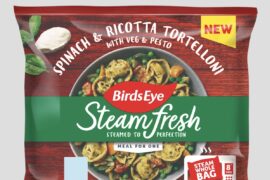Feltham, England-headquartered Nomad Foods and the WWF conservation organization are partnering to find agricultural solutions to the “triple challenge of feeding a growing global population, while tackling the climate crisis and reversing biodiversity loss.”
Their cooperative effort will focus initially on two main projects centered around vegetable production. One, a blueprint for landscapes that can increase food productivity through “nature-positive” farming approaches; the other, dedication to measuring the impact of biodiversity at the farm level to target interventions and find new ways of increasing pollinators such as bees and other species.

On-pack communication for consumers, explaining how Nomad Foods’ frozen products and WWF are “working together to protect bees, butterflies and plants” will roll out initially across four countries, starting with the Iglo brand in Belgium and Portugal and Findus in Spain starting in April, followed by Birds Eye in the UK in June.
“We want to help our consumers eat more sustainably by providing widespread access to great tasting food that is better for people, better for the planet and affordable,” said Nomad Foods CEO Stéfan Descheemaeker. “To support this, we are committed to sourcing 100% of our vegetables and potatoes through sustainable farming practices by 2025, with 77% of our own grown vegetables already verified as such.”

Tanya Steele, chief executive of WWF-UK, commented: ”Changing the way that we produce and consume food is at the heart of WWF’s mission to build a sustainable future for people and nature. That’s why we’re delighted to be working in partnership with Nomad Foods, not only to reduce the environmental impact of farming, but also to encourage people to eat a more plant-rich diet that’s healthy for them and for the planet.”

Nomad Foods is dedicated to continually building on sustainable farming standards in line with global best practices. It uses the Sustainable Agriculture Initiative Platform (SAI Platform) Farm Sustainability Assessment (FSA) as a benchmark for farmers, and the target is for all suppliers to be verified as minimum silver and progress towards gold.
In October 2020, Birds Eye farm management group became the first in the UK and the first ever in the frozen food sector globally, to be verified as FSA Gold Level for sustainable food production. In February 2021, Iglo Germany was verified as FSA Gold for all “own grown” spinach, herbs and autumn vegetables. Fully 77% of Nomad Foods’s total vegetable and potato volumes are grown in line with minimum FSA Silver Level, and the company expects to have more than 70% of “own grown” vegetables at FSA Gold by the end of 2021.
Nomad Foods is also a partner in The Sustainable Landscapes Humber Project – a collaboration with Yorkshire Water, Future Foods Solutions and Hull and Teeside University, announced in 2020. Over 40 farmers who grow peas for Birds Eye UK are planting a diverse range of cover crops to capture carbon, reduce flooding and improve soil health.






